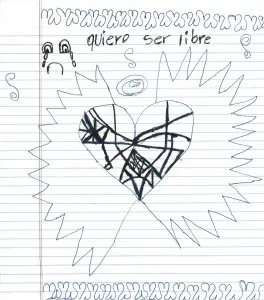
It’s been over a year since the Obama Administration massively expanded the practice of family detention in response to the influx of unaccompanied minors and families fleeing to the U.S. from Central America. Despite largely ending the practice of detaining families in 2009, three new facilities were opened last year, including the largest family detention center in U.S. history in Dilley, TX, with capacity for 2,400 beds. Since last summer, more than 4,800 individuals have been booked into prison-like facilities throughout the country, primarily young mothers and their children. Perhaps most troubling is that these families continue to be treated as threats to national security despite the fact that recent USCIS statistics document that 88 percent of detained mothers and children have valid asylum claims and that the average age of a child in family detention is just 6-years-old.
As advocates for children, First Focus has been pushing for an end to family detention not only because is it a misguided policy, it’s also fundamentally bad for kids. Our new fact sheet summarizes the principal reasons why the practice is harmful to a child’s physical and mental health and overall development. The unlicensed facilities simply do not have the capacity to deal with the special needs of women and children, including providing adequate health care services. Just last week, it was reported that 250 children were accidentally given an adult dosage of the hepatitis A vaccine at the Dilley facility, which currently holds approximately 2,000 women and kids. This serious error, which could have a direct impact on children’s health, is yet another confirmation that family detention is completely inappropriate for children.
Research also tells us that the longer children are held in confinement, the greater the harm. I had the chance to meet several of these kids last summer when I visited the temporary facility in Artesia, NM, and each child I encountered was showing clear signs of anxiety: lack of sleep, loss of weight, constant crying. And while a lot of the debate in recent months has focused on improving the conditions in these facilities, the bottom line is that there is no acceptable or appropriate way to detain children and families, particularly those who have been traumatized. A child can still tell the difference between a normal playground and one within a locked facility. In fact, a drawing by a detained girl shared with a congressional delegation last month reads, “I want to be free.”
The good news is that that there has been a great deal of momentum to end family detention in recent months. Two lawsuits have forced the Administration to review its policies to ensure that they have release options in place for families who pass a credible fear interview and to determine whether detaining children in these facilities violates the Flores settlement, an agreement that defines the appropriate treatment of children impacted by immigration enforcement and explicitly states that children are to be held in the least restrictive environment possible. A diverse range of advocates—representing faith, children, women, civil rights, and immigrant rights communities—have been rallying for months to end the inhumane practice. Significant media attention has helped shed light on the severe harm to children (many of whom have now spent the majority of their lives behind bars), the alarming lack of due process for asylum-seeking families, and the stories of women and children who have endured unspeakable violence only to be punished for seeking refuge. Mothers themselves within the facilities have been protesting their confinement through hunger and work strikes, and Members of Congress from the both the House and Senate have called on the Administration to end this shameful policy.
The bad news is that the fight is not over. Every day that a mother or child continues to be wrongfully detained means that there is still work to be done. Every day that a child is robbed of his or her childhood is a reason to keep pushing. Every day that a vulnerable family is punished simply for seeking safety is a day that we need to call on the Administration to do the right thing and end family detention once and for all.
Detaining Children and Families is Still the Wrong Policy http://bit.ly/1fhCHhv via @First_Focus Voices for Kids Blog #EndFamilyDetention
![]() Tweet this now.
Tweet this now.
Want to learn more? First Focus is a bipartisan advocacy organization dedicated to making children and families the priority in federal policy and budget decisions. Read more about our work on family detention.
Want to get involved? You can support our work by making a donation or joining our mailing list to receive updates and action alerts on this issue.